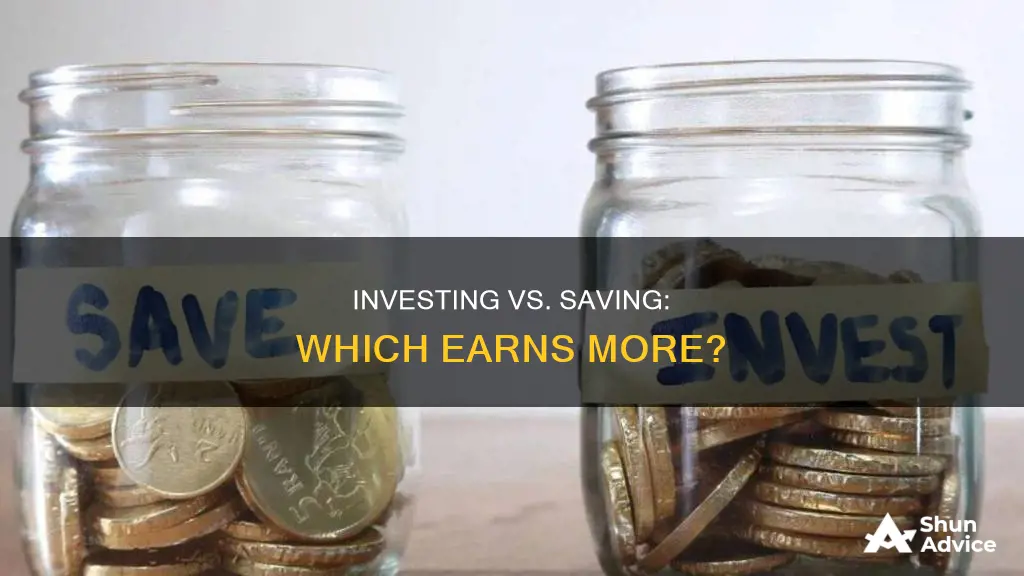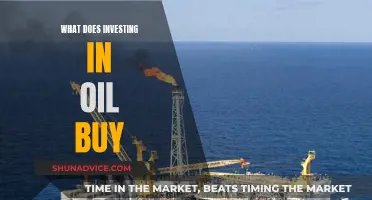
Saving and investing are both important concepts for building a sound financial future, but they are not the same thing. While both can help you achieve your financial goals, it's essential to understand the differences between the two and when it's best to save or invest. This paragraph will explore the key distinctions between saving and investing, including risk levels, returns, liquidity, and time horizons, to provide a comprehensive overview of when each strategy is most suitable.
| Characteristics | Values |
|---|---|
| Risk | Savings accounts have minimal risk, whereas investing comes with the risk of losing money. |
| Returns | Savings accounts have lower and more predictable returns, whereas investing has the potential for higher returns. |
| Time horizon | Savings are suitable for short-term goals, while investing is for the long term. |
| Liquidity | Savings accounts offer immediate access to funds, whereas investments may have penalties or taxes for early withdrawal. |
| Inflation protection | Savings may lose purchasing power over time due to inflation, whereas investing can help beat inflation. |
| Taxes | Savings account interest is taxed at ordinary income rates, while investments have favourable tax treatment for qualified dividends and long-term capital gains. |
What You'll Learn

Savings accounts vs. investment accounts
Savings accounts and investment accounts are both important for building a sound financial foundation, but they are not the same thing. While both can help you achieve a more comfortable financial future, it's crucial to understand the differences between the two and when it's best to save or invest.
Savings Accounts
Saving money typically means storing it safely in a bank account so that it is available when needed and has a low risk of losing value. Savings accounts generally offer a low return but are also low risk. They are ideal for short-term financial goals, such as buying a new gadget, going on vacation, or building an emergency fund. Here are some pros and cons of savings accounts:
Pros:
- Provides a financial safety net for unexpected events.
- Offers liquidity for purchases and other short-term goals.
- Minimal risk of loss as savings in banks are often insured.
Cons:
- May lose out to inflation, causing a decrease in purchasing power.
- Opportunity costs when not invested in riskier but higher-yielding assets.
Investment Accounts
Investing, on the other hand, typically involves taking on some risk with the potential for higher returns over the long term. It is a way to grow your money by putting it into financial instruments such as stocks, bonds, and mutual funds. Investing is usually associated with longer-term goals, such as saving for retirement, a child's college fund, or a down payment on a house. Here are some pros and cons of investment accounts:
Pros:
- Potential for higher returns compared to savings accounts.
- Ability to grow your wealth over time through compounding and reinvestment.
- Opportunity to achieve long-term financial goals.
Cons:
- Risk of losing money, especially in the short term.
- Requires discipline and a long-term perspective to withstand market volatility.
- May require longer time horizons to see significant returns.
When to Save vs. Invest
The choice between saving and investing depends on your financial situation, goals, and risk tolerance. Here are some guidelines to help you decide:
- Save if you don't have an emergency fund: Financial advisors recommend having an emergency fund as your first priority. It's generally advised to save at least three to six months' worth of living expenses.
- Save if you need the money within the next few years: For short-term goals or expenses that you plan to incur within the next few years, it's best to keep your money in a savings account where returns are guaranteed.
- Invest if you have a topped-up emergency fund: Once you have a sufficient emergency fund or are making good progress towards it, you can consider investing more of your money.
- Invest if you've paid off high-interest debt: Focus on paying off high-interest debt, such as credit card balances, before investing. Investing makes more sense when you're only dealing with low-interest debt like student loans or mortgages.
- Invest for long-term goals: If you have financial goals that are at least three to five years away, investing can provide higher returns than savings accounts. This includes goals like retirement planning or saving for a child's college education.
In summary, both savings and investment accounts play important roles in your financial strategy. Savings accounts offer security and easy access to your money, while investment accounts provide the potential for higher returns over the long term. The key is to find the right balance between the two based on your financial goals and risk tolerance.
Pay Off the House or Invest: Navigating the Pros and Cons
You may want to see also

Short-term savings vs. long-term investments
When it comes to short-term savings versus long-term investments, there are several key factors to consider. Here are some insights to help you understand the differences and make informed decisions:
Short-Term Savings:
- Time Horizon: Short-term savings are typically suitable for financial goals that you want to achieve within the next three years. This includes emergencies, unexpected expenses, upcoming vacations, or purchases like a new phone or laptop.
- Risk and Returns: Short-term savings are generally low-risk options, such as savings accounts, money market accounts, or certificates of deposit (CDs). These options offer predictable and stable returns but tend to have lower interest rates compared to riskier investments.
- Accessibility: Short-term savings provide immediate access to your funds. You can easily transfer money into and out of your savings account or withdraw it when needed without penalties or taxes.
- Inflation Impact: One drawback of short-term savings is the potential loss of purchasing power due to inflation. The low returns offered by these accounts may not always keep up with inflation, resulting in a decrease in the value of your savings over time.
Long-Term Investments:
- Time Horizon: Long-term investments are ideal for financial goals with a horizon of at least three to five years, or even longer. This includes retirement planning, saving for a child's education, or building generational wealth.
- Risk and Returns: Long-term investments, such as stocks, bonds, mutual funds, or exchange-traded funds (ETFs), offer the potential for higher returns compared to short-term savings. However, they come with a higher risk of losing money, especially in the short term, as the value of these investments can fluctuate.
- Accessibility: Long-term investments may have barriers to access, such as penalties or taxes for withdrawing investment gains early. It's important to let your money stay invested for a longer period to ride out the inevitable ups and downs of the financial markets.
- Inflation Impact: Long-term investments can help you beat inflation and increase your purchasing power over time. By investing in a diversified portfolio, you can aim for returns that outperform inflation, ensuring your money grows in real terms.
Key Considerations:
- Risk Tolerance: Your risk tolerance plays a crucial role in deciding between short-term savings and long-term investments. If you are comfortable taking on more risk and can withstand potential short-term losses, long-term investments may be more suitable. On the other hand, if you prefer security and stability, short-term savings might be a better option.
- Financial Goals: Different financial goals have different timelines. Short-term savings are ideal for immediate or near-term goals, while long-term investments are designed for goals that are further away.
- Diversification: Diversifying your portfolio across various investment options can help reduce risk and improve returns. This involves allocating your funds across different asset classes, sectors, or geographic regions to minimize the impact of market volatility.
- Professional Guidance: Consult a financial advisor or planner to determine the best strategies for your specific circumstances. They can provide personalized advice based on your financial goals, risk tolerance, and time horizon.
Rich Investors: Why Startups?
You may want to see also

Pros and cons of saving
Saving money is an important habit to build for several reasons. Here are the pros and cons of saving:
Pros of Saving
- Safety Net: Having savings can act as a safety net during hardships and unexpected life events, such as medical emergencies, unemployment, natural disasters, home repairs, or family emergencies. It can provide peace of mind and help you avoid building up debt.
- Meeting Life Goals: Saving allows you to meet various life goals, such as pursuing higher education, buying a home, taking your dream vacation, or starting a business. The sooner you start saving, the faster you will achieve these goals.
- Reduced Financial Stress: Establishing consistent savings habits can relieve financial stress and provide a sense of control over your future. It helps create a buffer against unforeseen expenses and reduces the likelihood of accumulating debt during challenging times.
- Better Money Management: Saving encourages better money management and financial discipline. It helps you prioritize and plan for the future, ensuring you have funds for both short-term and long-term goals.
- Interest Earnings: Keeping your money in a savings account can earn you interest, helping your savings grow over time. Some savings accounts offer higher annual percentage yields (APYs), allowing your money to grow faster.
- Easy Access to Funds: Savings accounts typically provide easy access to your money. You can withdraw funds whenever needed, and many banks allow you to link your savings and checking accounts for added convenience.
Cons of Saving
- Opportunity Cost: Saving means not spending, and there can be a trade-off between saving and spending on experiences or necessary expenses. For example, you might miss out on travel opportunities, social events, or necessary maintenance or repairs by being too focused on saving.
- Lower Returns: Compared to risk-based investments, such as the stock market or real estate, savings accounts typically offer lower returns. While safer, your money may not grow as significantly over time.
- Temptation to Spend: Having easy access to your savings can be a double-edged sword. The temptation to dip into your savings for frivolous spending may be harder to resist, hindering your ability to meet your financial goals.
- Minimum Balance Requirements: Some savings accounts have minimum balance requirements to avoid maintenance fees. This can be challenging if you have a tight budget, and the fees could eat into your savings.
- Variable Interest Rates: Interest rates on savings accounts can vary with the federal funds rate. If the rate drops, your savings growth may be affected, resulting in lower returns than expected.
In conclusion, finding a balance between saving and investing is essential. Building an emergency fund and saving for short-term and long-term goals are crucial, but it's also important to consider investing for potentially higher returns once you have a solid financial foundation.
Silver Investment: Shine or Shyster?
You may want to see also

Pros and cons of investing
Investing typically comes with a longer-term horizon, such as saving for children's college funds or retirement. It is a way to grow your money over time by putting it into financial instruments such as stocks, bonds, and mutual funds.
Pros of Investing
- Potential for higher returns than savings accounts
- Can help achieve long-term financial goals
- Diversification can reduce risk
Cons of Investing
- Risk of loss, especially in the short run
- Requires discipline and commitment
- May require longer time horizons
Pros
- Stay ahead of inflation
- Don't need a lot of money to start investing
- Income from price appreciation and dividends
- Liquidity
Cons
- Takes time to research
- Taxes on profitable stock sales
- Emotional ups and downs
- Competing with institutional and professional investors
Investments: What's Hot Right Now
You may want to see also

When to save and when to invest
Saving and investing are both important for building wealth, but they serve different purposes and come with their own pros and cons. So, when should you save, and when should you invest?
When to Save
- For short-term goals: Savings are generally recommended for short-term goals, such as buying a new gadget or going on vacation. This is because savings are more liquid and accessible, whereas investments are often tied up for longer periods.
- For emergencies: It is generally recommended to have an emergency fund with three to six months' worth of living expenses in a savings account. This will help you stay out of debt and cover unexpected costs.
- When you need quick access to funds: Savings accounts allow you to withdraw money quickly and easily, whereas investments may have penalties or taxes for early withdrawal.
- When you want to preserve your capital: Savings accounts are a safer option if you want to avoid the risk of losing money. While interest rates may be low, your principal amount is protected.
- When you have immediate or near-term expenses: If your monthly income won't cover unexpected costs, saving can help you avoid taking on high-interest debt.
- When you have high-interest debt: It is generally recommended to pay off high-interest debt before investing. Focus on debts with interest rates of 10% or higher.
- When you're not comfortable with risk: Investing comes with the possibility of losing money, so if you're risk-averse, saving may be a better option.
When to Invest
- For long-term goals: Investing is typically recommended for long-term financial goals, such as retirement, saving for college, or building generational wealth. This is because investments have the potential for higher returns over time.
- When you can take on risk: Investing is riskier than saving, as there is always the possibility of losing money. However, with greater risk comes the potential for greater rewards.
- When you can invest for at least five years: Investments tend to perform better over longer periods, as they can ride out short-term downturns.
- When you want to beat inflation: Savings accounts may not keep up with inflation, causing your money to lose purchasing power over time. Investing, especially in stocks or bonds, can help you stay ahead of inflation.
- When you have an employer match: If your employer matches your contributions to a retirement account, such as a 401(k), investing can be a great way to take advantage of "free money."
- When you have built up an emergency fund and paid off high-interest debt: Once you have a solid financial foundation, investing can help you grow your wealth over time.
A Balanced Approach
It's important to find the right balance between saving and investing, depending on your financial situation, goals, and risk tolerance. While investing may offer higher returns, it's crucial to have a safety net of savings to fall back on. Additionally, consider diversifying your investments to reduce risk and maximize returns.
Finding Your Investment Soulmate
You may want to see also
Frequently asked questions
Investing has the potential for higher returns than savings accounts, and it can help you grow your wealth over time through compounding and reinvestment. It can also help you achieve long-term financial goals, such as saving for retirement or buying a house. However, there is always the risk of losing money when investing, and there are no guarantees of making a profit. It requires discipline and a long-term perspective, which can be challenging during market volatility.
Saving is an excellent way to meet short-term financial goals and prepare for unexpected situations. It provides a financial safety net and liquidity for purchases. Savings are generally low-risk, meaning your money is safe, but the interest rates received are also low. Savings can lose purchasing power during periods of rising inflation.
Saving is ideal if you don't have an emergency fund or if you need the cash within the next few years. Investing is suitable for long-term goals, typically five years or more, that require financial growth through higher returns, such as retirement and college tuition.







